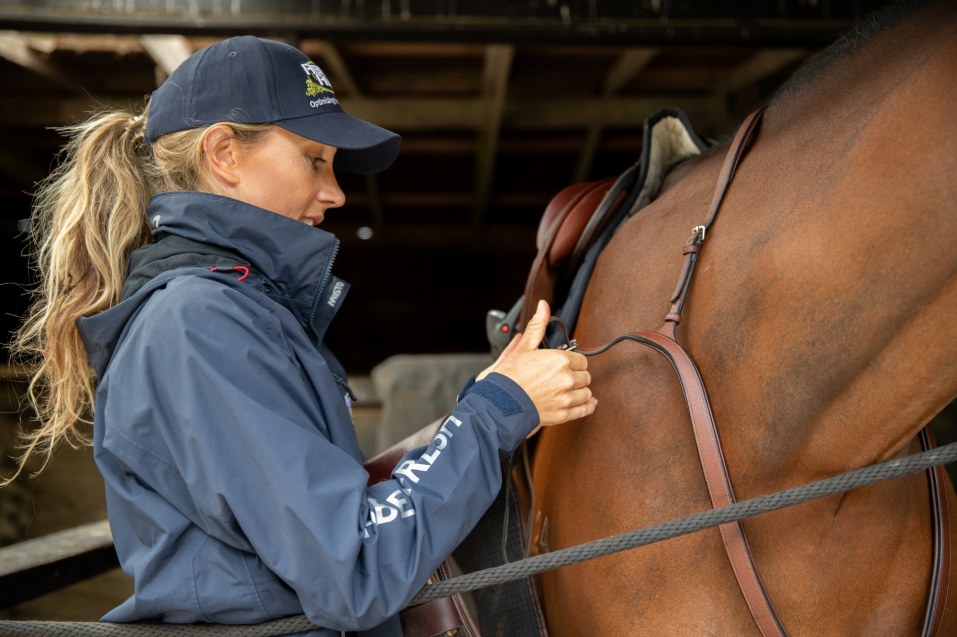
By Dr Nerida Richards B. Rur Sc PhD (RAnNutr)
The question of whether you should feed a horse before exercise is one that is commonly asked. Most of us were told over and over again by our parents not to swim for 30 minutes after eating or we would get a muscle cramp, so we generally tend to think that eating before exercise is not a wise thing to do. But is this the case for horses? The answer is yes and no…
Empty stomach or full stomach before exercise
The horse is a monogastric and a continuous grazer, so logic says that a horse’s stomach should never be empty. Having a full stomach is important for the horse as it stops gastric acids from the lower part of the stomach splashing around and irritating the upper sections of the gastrointestinal tract. This acid splash that occurs in horses exercised on an empty stomach is thought to contribute to the development of gastric ulcers.Therefore, if a horse is stabled without constant access to forage, or if it has been more than 2 hours since the horse last grazed or fed, you should feed your horse before exercise. A small feed will protect a horse from gastric ulcers in 2 ways. Chewing the feed will stimulate saliva production and saliva acts as a buffer in the stomach. And the feed will fill up the stomach and prevent gastric acids from splashing around (for more information on Gastric Ulcers you should read FeedXL Newsletter #8 Preventing Gastric Ulcers).
buffering protection for the
stomach. While any forage that forms parts of your horse’s everyday diet is acceptable, if you are concerned about gastric ulcers in your horses, alfalfa (lucerne) hay has been shown to be helpful when it comes to preventing or resolving ulcers, so if alfalfa hay is available and is fed as part of your horse’s normal diet, this would make a good choice for a pre‐ride or exercise feed.
How much hay should be fed?
While you don’t want to give your horse a very large feed of hay before exercise you do need to feed enough to provide some fill in the stomach. Depending on when your horse was last fed, you should feed between 200 – 300 g/100 kg (0.2 – 0.3 lb/100 lb) of bodyweight, using the larger meal size if your horse hasn’t been fed for 5 or more hours and the smaller meal size if it has been 5 hours or less since your horse’s last meal.What should not be fed before exercise?
Never feed grain within 4 to 5 hours of a ride or exercise, and that includes any feed that is high in starches or sugar. The starches and sugars in these feeds are absorbed from the small intestine largely as glucose, which triggers the release of insulin from the horse’s pancreas. Blood glucose and insulin levels following a grain feed generally peak at 2 to 3 hours following a meal and return to normal within 4 to 5 hours. Insulin is a hormone that instructs the horse’s muscles and organs to store away glucose. So if there is insulin in a horse’s blood when exercise starts, the horse isn’t able to mobilise glucose stores to burn and fuel the muscles during work (because insulin is there telling the muscles to store all the glucose away). The horse’s ability to burn fat as an energy source is also reduced when insulin is present. The result of feeding a grain or high starch and sugar feed too close to when the horse is exercised is the horse that will run out of muscle energy supplies and fatigue quickly.This concept is particularly important for high intensity exercise where a horse’s glucose supplies are burnt up very quickly. In endurance type activities, large grain meals should not be fed within 4 to 5 hours prior to the start of exercise, however smaller grain meals may be fed during exercise to top up muscle glycogen stores and prolong the time to fatigue.
In summary …
Horses are constant feeders so they should, in theory, always have a full stomach. Feeding a small meal of hay just before exercise, particularly if it has been 2 or more hours since a horse’s last feed, will stimulate saliva production and provide fill in the stomach to protect the stomach from gastric ulcers.In contrast, grain or any feed high in starches or sugars should not be fed within 4 to 5 hours of exercise as these feeds trigger an insulin response which then stops a horse from mobilising the muscle glycogen and fat stores it needs to fuel muscles during exercise. And this will result in your horse tiring quickly.

